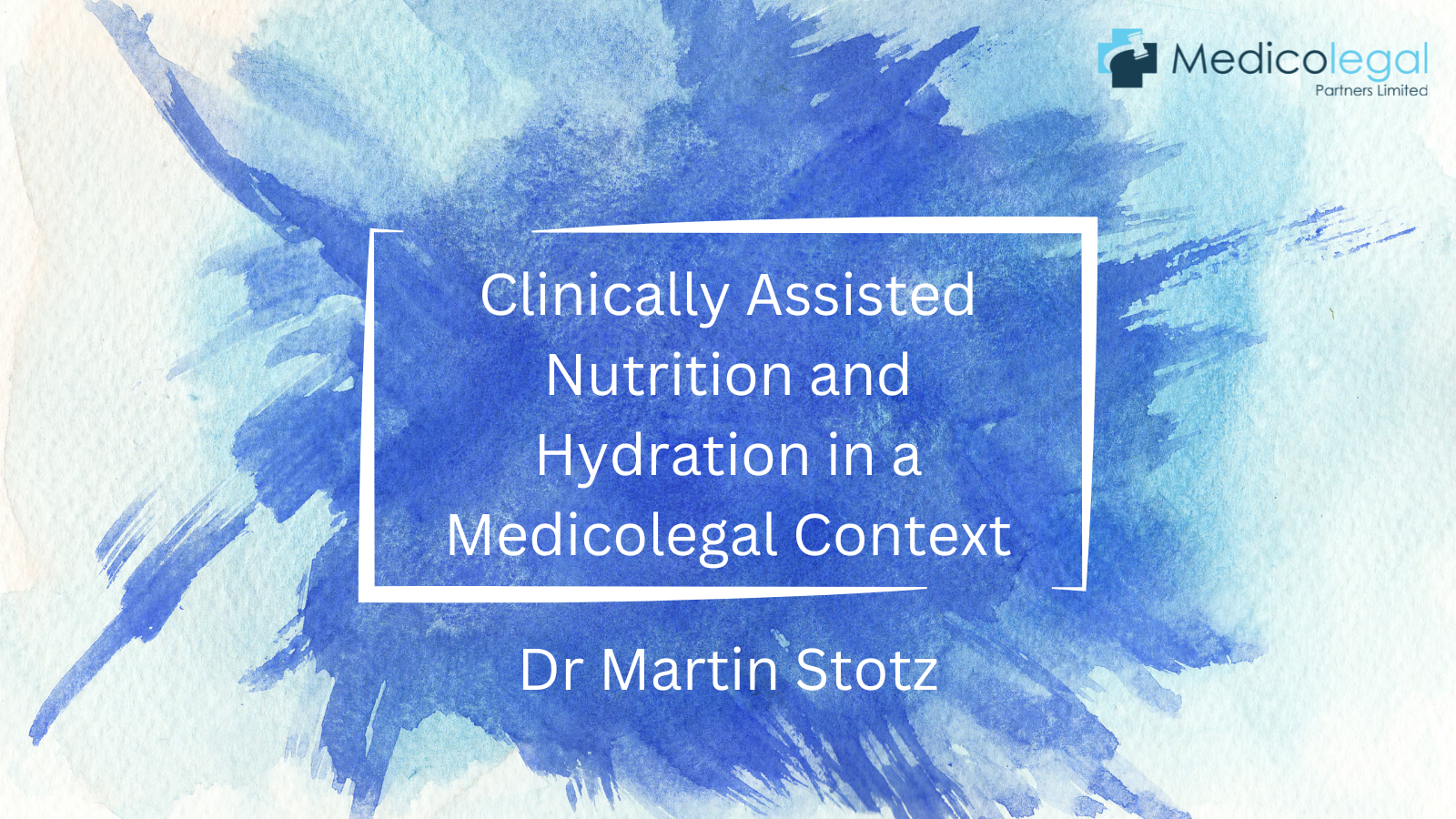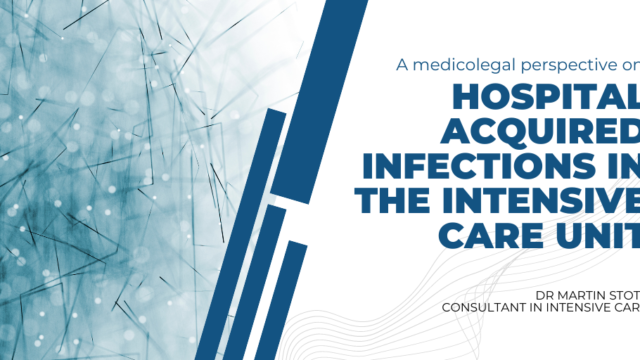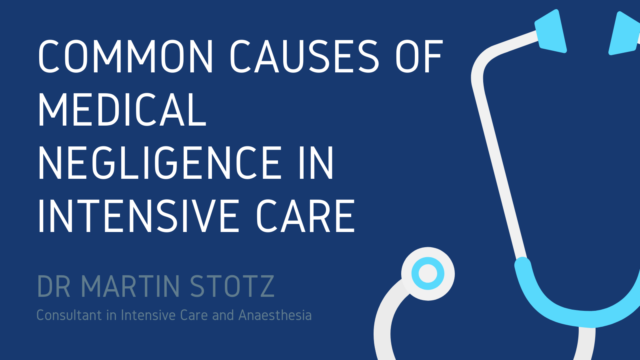Clinically Assisted Nutrition and Hydration in a Medicolegal Context

As well as being vital to sustaining life, food and drink have important psychological, social and cultural significance. However, elderly patients, who often have complex medical needs, may develop difficulties with eating and drinking due to chewing and swallowing difficulties. The resulting coughing and choking episodes can be very distressing and other feeding options may then be considered. As well as benefits and risks, these raise some difficult ethical questions.
Clinically assisted nutrition and hydration (CANH) refers to all forms of artificial nutritional support, and includes intravenous parenteral nutrition and intravenous hydration, nasogastric tube feeding and the interventional placement of dedicated feeding devices such as percutaneous endoscopic gastrostomy, percutaneous endoscopic jejunostomy and radiologically inserted gastrostomy.
The provision of CANH is believed to bring many benefits, including the prevention of thirst, delirium, hypercalcemia and opioid toxicity due to increasing renal perfusion. Weight loss in the elderly is also associated with higher rates of mortality and morbidity, decline in functional capacity, institutionalisation and an overall reduction in quality of life.
However, there are also many negative effects associated with CANH. These may include peripheral oedema and increasing cardiac failure due to fluid overload, as well as worsening of vomiting, diarrhoea, bloating, cramps and respiratory secretions. Tube feeding is associated with an increased risk of aspiration, pressure ulcers, infections , and misplaced tubes can lead to serious complications and death. Many patients find the tube uncomfortable and may need to be restrained to prevent them from removing it. If tube feeding takes place outside hospital, it is important that the patient, family members and other carers fully understand the burden and potential complications associated with CANH, and receive adequate instruction in the correct techniques.
One major drawback for patients receiving CANH is the loss of the sensation of taste and texture while eating, as well as the social and human contact that surrounds mealtimes. Therefore, CANH may actually reduce quality of life and may even shorten life expectancy. In particular, there is evidence that CANH does not prolong life in patients with advanced dementia, nor does it improve nutritional status.
In many, but not all cultures, CANH is considered a medical intervention, and therefore its initiation and withdrawal need to be medically and ethically justified. CANH should only be initiated if there is a clear indication for medical treatment and its use will allow a defined therapeutic goal to be achieved. Therefore, regular review and re-evaluation are essential. Where a decision is made by medical staff to withhold or withdraw CANH, it is vital that the reasons behind this are clearly documented and sensitively explained to the patient and family members. If the patient is not within hours or days of death, the UK General Medical Council recommends that a second clinical opinion be sought. According to UK law, if a treatment is not deemed to be in the patient’s best interests it can legally be withheld. In these circumstances, it could actually be unlawful to initiate treatment. When determining best interests, social and psychological issues should be considered alongside the medical aspects of each case. It is also important to remember that while the sanctity of life should guide decision-making, this does not mean that life should be preserved at all costs. Therefore, while a decision to withhold CANH may allow the patient’s condition to progress to its natural end, in legal terms, this is not the same as intentionally killing the patient.
The patient’s wishes, or those of the family, should also be taken into consideration. However, family members can only make a decision on a patient’s behalf if a Power of Attorney agreement exists. These views may be influenced by the patient’s cultural and religious background and sensitivity to these is vital. It is also important to accept that a patient’s wishes may change as they near death. A patient who still has mental capacity is within their rights to voluntarily cease CANH. However, depression and disease can reduce appetite, potentially leading to a decision that may not be in the patient’s best interests, and it is important that these causes are ruled out first.
When the decision to provide CANH is not clear-cut, a trial period of treatment may prove useful. For example, the prognosis for a patient who has suffered an acute stroke may be uncertain, particularly in the early stages, but without the provision of CANH, recovery would be delayed and the outcome would be poorer. As recovery progresses, a decision can then be made on whether to continue with CANH.
Due to the cultural significance of food and drink, the emotional and ethical issues surrounding CANH are more complex than for any other life-sustaining treatment. Patients should be allowed to eat and drink by mouth for as long as is practical, but when this becomes impossible, decision-makers should start from the presumption that it is in the patient’s best interests to receive sustenance. However, there are circumstances in which this is not appropriate, or goes against the patient’s wishes. Therefore, the initiation and withholding or withdrawing of CANH should be considered on an individual basis, so that the best decision for each patient can be made.
Further reading:
Carter A. N. (2020). To What Extent Does Clinically Assisted Nutrition and Hydration Have a Role in the Care of Dying People? Journal of Palliative Care, 35(4), 209–216. https://doi.org/10.1177/0825859720907426
Porter, K., Burch, N., Campbell, C., Danbury, C., Foster, C., Gabe, S., Goddard, A., Harp, K., Holdoway, A., Hughes, T., Ball, K. L., Nightingale, J., Rochford, A., Keene, A. R., Smith, A., Smith, T., & De Silva, A. (2021). Supporting people who have eating and drinking difficulties. Clinical Medicine, 21(4), e344–e350. https://doi.org/10.7861/clinmed.2021-0161




